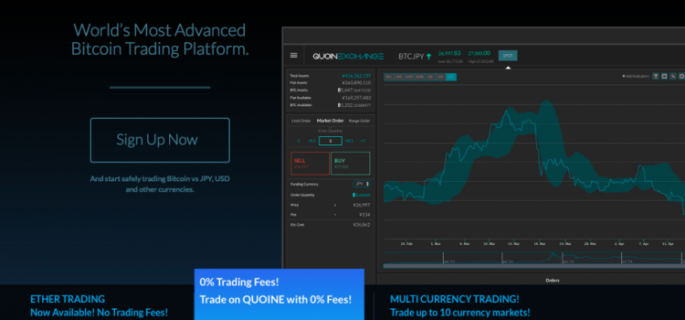Bitcoin exchange Quoine raises $20m venture investment

Quoine, a Singapore-based Bitcoin exchange, has closed a $20 million funding round, leveraging off the large opportunity for Bitcoin in the Japanese market, led by venture capitalists (VCs) and other ‘strategic investors’.
It’s last funding round was a $2 million angel investment in December 2014.
The latest investment will see it shift its headquarters to Tokyo from Singapore. The Singapore office will remain as a subsidiary.
Mike Kayamori, co-founder and CEO of Quoine, in an interaction with Bitcoin.com, explained that it would continue to maintain an Asian focus, given that Asia trading exceeded expectations.
This is part of a series of investments closed by Japanese bitcoin exchanges this year. bitFlyer closed a $27 million investment in April 2016 and Zaif raised $6.5 million in May 2016.
This pattern in funding, with increasing involvement in bitcoin investment by corporates, is reflective of how all of 2015′s largest blockchain and bitcoin deals involved corporates and strategics, with 2016 maintaining this trend. This comes at a time when financial institutions and corporates are grappling with the association between bitcoin and the blockchain. 
The Bitcoin scene
Bitcoin is a decentralised digital asset, digital commodity money and payments system invented by Satoshi Nakamoto in 2008. It operates via peer-to-peer (P2P) networks in a manner similar to the BitTorrent network. In terms of transactions, users are pseudo-anonymous and can make transactions securely and at little cost in a minimal amount of time.
It is strongly deflationary, given that the supply of bitcoins is finite and capped at 21 million bitcoins. Inflationary until this hard cap, growing adoption will see bitcoins preserve their value relative to fiat currencies, where increases in money supply lead to inflation that devalues them and decreases their purchasing power.
Launched in June 2015, the bitcoin exchange taps on the potential of Japan for cryptocurrencies and bitcoin. The third largest economy in the world and second largest in the Indo-Asia Pacfic, the Pacific island state has introduced regulations for bitcoin exchanges, in a bid to regulate and legitimise trading in the cryptocurrency.
Late last year, the European Union’s Court of Justice ruled that bitcoin exchange transferring conventional currencies such as euros or Swedish krona into bitcoin for a fee are exempt from value-added taxes.
This will have a net positive effect on the crytpcurrency sector as a whole, as this will see cryptocurrencies digitally transferred and used as means of payment for goods and services with Japan legitimately and will see a reduction in the rate of casualty in the market caused by fraud due to strict law and regulation in the market.
In an interview with The Japan Times, former CEO and current President, Mario Gomez Lozada stated: “When we thought about it, Japan is the third-biggest economy in the world, huge economy, huge market . . . nobody was really tapping that market from a bitcoin perspective.”
While it may take time to build a customer base, Lozada is confident of attracting Japanese consumers to Quione, as he states it is built based on his experience ad knowledge of working with traditional banking systems. In fact, much of the core management team have worked with the likes of Merrill Lynch, UBS, Credit Suisse, HSBC and SoftBank.
A core part of bitcoin is the blockchain, a core technology that function as an public ledger that recorded every transaction of the currency since inception. In an interaction with DEALSTREETASIA, Kayamori commented that he foresaw banks automating through the public ledger via the use of smart contracts.
Speaking on the topic of the digitisation of currencies and how regional currencies could develop, Kayamori shared with DEALSTREETASIA: “The Euro was an excellent thesis, but the implementation was wrong. Each country cannot control their own money flow. The global currency is the Bitcoin cryuptocurrency and it’s driven by supply and demand, much like other fiat currencies.”
With the bitcoin network maintained by miners – who use extremely powerful computers checking on whether people are attempting to alter the records kept by the blockchain – who are incentivised by the receipt of bitcoins as a reward for keeping the ledger accurate – this enables it to operate as a legitimate and decentralised currency platform without a central authority, given its ‘trustless’ nature.
Increasingly, many large financial services firms and institutions, as well as large corporate strategic investors, are focusing their attention on bitcoin and the associated blockchain technologies.

Current trends
While noted for its high volatility in its early days, particularly in the 2013/2014 period, bitcoin has since stabilised as it matures, arguably becoming as stable as gold.
In a NASDAQ opinion piece, former FX trader and finance journalist Martin Tiller opines: “As I said, I still believe that we are in a disruptive period for Bitcoin in a positive way. The increase in projects using blockchain-like systems is bringing some reasoned coverage and many more are beginning to understand what bitcoin is and how it can be a force for good.”
“The price of bitcoin really doesn’t matter much when it is viewed from an historical perspective, nor is a drop to $300 an existential threat. The volatility that we are seeing, however, when taken as a whole, could easily steer bitcoin away from what I believe to be its true function, that of a currency rather than an investment,” Tiller concluded.
Elaborating on Japan’s investment space, in his interaction with Bitcoin.com, Kaymori highlighted how online currency trading, store loyalty point cards and mobile game tokens were popular forms of speculative investment in Japan. When coupled with deflation and a cultural aversion to investing in stock markets and funds, Japanese retail investors tend towards investing in the forex markets.
“From a liquidity and volume perspective, I think Japan is going to be larger than China. When you look at retail FX, you don’t need any explanation. Japan’s retail FX liquidity already dwarfs any other country in the world,” said Kayamori,
Mindful of this, Quoine is adopting a business-to-business (B2B) trajectory that will see it position itself as an “exchange for exchanges” offering liquidity to established brokerages. These brokerages will be able to explore and leverage on the possibilities presented by cryptocurrency trading for further revenue growth.
In statements to DEALSTREETASIA in relation to the investment, Kurt Hanson, an angel investor in Quoine, said, “The $20 million in new investment is a vote of confidence in Quoine. With the funds I’m looking forward to seeing the company greatly accelerate and expand its business in Asia and taking bitcoin mainstream. I see Quoine continuing its amazing growth over the next 5 years, especially in the remittance market of developing countries of Asia.”
He continued, “And the company is working on what it calls Banking 3.0, which will turn it into a virtual bank available to one and all – sort of the Uber and AirBnb of banks. The bitcoin market will continue to grow at a slow and steady pace, the challenge will be to convince the average consumer that bitcoin will be of benefit to them.”
Hanson added, “As part of our move to banking 3.0 strategy, we will spin off some of our very own technologies such as the loans platform and work with exiting Fintech companies to make services available via mobile app by tapping into their API’s. Our goal is to provide a full banking solution, ranging form the basic deposits, interest earning accounts, fund transfers via blockchain wallet technologies, to the more advanced features such as loans, wealth management, investments and trading.”
Source: Deal Street Asia





























